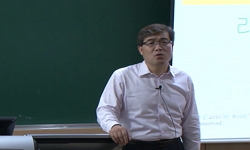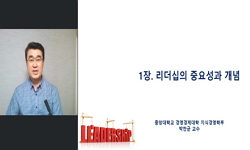This paper is a piece of researching the model of leader and the leadership that Confucius intends to at Analects of Confucius in order to derive the leader and leadership to meet in the present age. A leader is a person managing human society soon, a...
http://chineseinput.net/에서 pinyin(병음)방식으로 중국어를 변환할 수 있습니다.
변환된 중국어를 복사하여 사용하시면 됩니다.
- 中文 을 입력하시려면 zhongwen을 입력하시고 space를누르시면됩니다.
- 北京 을 입력하시려면 beijing을 입력하시고 space를 누르시면 됩니다.
https://www.riss.kr/link?id=A104031954
- 저자
- 발행기관
- 학술지명
- 권호사항
-
발행연도
2009
-
작성언어
Korean
-
주제어
Leader ; Leadership ; Reflecting on oneself and Controling different people ; Man of virtue ; Saint ; Good manners and Righteousness ; Humanity ; Golden mean ; Accompaniment society ; 리더십 ; 수기치인 ; 군자 ; 성인 ; 인 ; 의 ; 예 ; 중용 ; 대동사회
-
등재정보
KCI등재
-
자료형태
학술저널
- 발행기관 URL
-
수록면
671-700(30쪽)
-
KCI 피인용횟수
11
- 제공처
- 소장기관
-
0
상세조회 -
0
다운로드
부가정보
다국어 초록 (Multilingual Abstract)
A name of a leader is very various at Analects of Confucius, but a man of virtue (君子)⋅a patriot(志士)⋅a wise man(賢人)⋅a saint(聖人) are often mentioned. Their common base consisted that as the model of leaders who have an scholarship and virtuous conduct, at concrete actualities, they continuously make theirs' best endeavors to actualize true humanity. At analects of Confucius, the leadership that Confucius presents is structured that reflecting on oneself(修己) as cultivation of one´s mind on the basis of regarding self-examination and introspection, and controling different people(治人) of embodying humanity(仁道) in the light of other's own on the basis of moral personality. In the inside, It is to reach to a field of a saint(聖人) with cultivating the bright goodness of the original nature from Heaven, in the outside embodying an ideal accompaniment society(大同) based on this inside holy mind of saints.
As a concrete way to implement humanity, sincerity and generosity(忠恕)⋅good manners and righteousness(禮義)⋅golden mean(中庸) are being mentioned at Analects of Confucius. Sincerity and generosity(忠恕) is the mentality which can make others to be anything in the light of one's own while exhausting own reason, good manners and righteousness(禮義) is the principle of an individual and a social community that is able to value judgment and standards of behavior on the basis of humanity(仁), golden mean(中庸) is balancing and fitness as a way which can achieve humanity(仁道).
There are pure integrity to pursue the more valuable than matter at this leadership of Confucius , and noble character to grant consideration and love to a different person. There are courtesy consciousness to aim at an act to be correct too, and strong righteous spirit to expel irrationality and immorality, and practicing truth and definition. There is philosophy of golden mean(中庸) which can respond to social change and request. This leadership shall become moderately re-illumination in the present community that is serious to be coexistence of mankind and aid-living together(相生).
This paper is a piece of researching the model of leader and the leadership that Confucius intends to at Analects of Confucius in order to derive the leader and leadership to meet in the present age. A leader is a person managing human society soon, and it is mentioned that leadership is the attitude of mentality, natural aptitudes and moral principles. The concept and contents of this leadership would differ according to changes of stream of the times and environment.
A name of a leader is very various at Analects of Confucius, but a man of virtue (君子)⋅a patriot(志士)⋅a wise man(賢人)⋅a saint(聖人) are often mentioned. Their common base consisted that as the model of leaders who have an scholarship and virtuous conduct, at concrete actualities, they continuously make theirs' best endeavors to actualize true humanity. At analects of Confucius, the leadership that Confucius presents is structured that reflecting on oneself(修己) as cultivation of one´s mind on the basis of regarding self-examination and introspection, and controling different people(治人) of embodying humanity(仁道) in the light of other's own on the basis of moral personality. In the inside, It is to reach to a field of a saint(聖人) with cultivating the bright goodness of the original nature from Heaven, in the outside embodying an ideal accompaniment society(大同) based on this inside holy mind of saints.
As a concrete way to implement humanity, sincerity and generosity(忠恕)⋅good manners and righteousness(禮義)⋅golden mean(中庸) are being mentioned at Analects of Confucius. Sincerity and generosity(忠恕) is the mentality which can make others to be anything in the light of one's own while exhausting own reason, good manners and righteousness(禮義) is the principle of an individual and a social community that is able to value judgment and standards of behavior on the basis of humanity(仁), golden mean(中庸) is balancing and fitness as a way which can achieve humanity(仁道).
There are pure integrity to pursue the more valuable than matter at this leadership of Confucius , and noble character to grant consideration and love to a different person. There are courtesy consciousness to aim at an act to be correct too, and strong righteous spirit to expel irrationality and immorality, and practicing truth and definition. There is philosophy of golden mean(中庸) which can respond to social change and request. This leadership shall become moderately re-illumination in the present community that is serious to be coexistence of mankind and aid-living together(相生).
국문 초록 (Abstract)
『논어』에서는 지도자의 명칭이 매우 다양하지만 군자(君子)ㆍ지사(志士)ㆍ현인(賢人)ㆍ성인(聖人) 등이 자주 언급되고 있다. 이들의 공통적 기반은 모두 학문과 덕행을 갖춘 지도자상으로서 구체적 현실에서 참된 인도(人道)의 실현을 위해 지속적으로 노력하는 가운데 이루어진다는 점이다. 특히 『논어』에서 공자가 제시하는 리더십은 먼저 자신에 대한 성찰과 반성이라는 기반위에서 이루어진 수양으로서의 수기(修己)와 이러한 도덕적 인격을 바탕으로 하여 다른 사람들에게 미루어 인도(仁道)를 구현하는 치인(治人)의 구조로 되어 있다. 즉 안으로는 하늘이 인간에 부여된 본성의 명덕(明德)을 수양하여 성인(聖人)의 경지에 이르는 것이며, 밖으로는 이러한 내성(內聖)을 기반으로 하여 이상적인 대동(大同)사회를 구현하는 것이다.
이러한 공자의 리더십에는 물질 이상의 세계를 추구하는 순수한 도덕성이 있으며, 다른 사람을 배려하고 사랑하는 높은 차원의 인격성이 담겨 있다. 또한 올바른 행위를 지향하는 품격 있는 예절의식이 있으며, 비리와 불의를 배척하고 진리와 정의를 실천하는 강한 의리정신도 있다. 또한 사회의 변화와 요청에 대응할 수 있는 중용의 철학이 있다. 이러한 리더십이 인류의 공존과 상생(相生)이 절실한 현대사회에 알맞게 재조명되어야 한다.
본 논문은 현대에 맞는 리더와 리더십을 도출하기 위하여 『논어』에서 공자가 지향하는 지도자상과 리더십에 대하여 연구한 글이다. 지도자는 곧 인간사회를 경영하는 사람이며, 리더십은...
본 논문은 현대에 맞는 리더와 리더십을 도출하기 위하여 『논어』에서 공자가 지향하는 지도자상과 리더십에 대하여 연구한 글이다. 지도자는 곧 인간사회를 경영하는 사람이며, 리더십은 지도자들이 갖추어야 할 정신자세와 자질 및 덕목들을 말한다고 할 수 있다. 이러한 리더십은 시대의 흐름과 환경의 변화에 따라 그 개념과 내용이 달라진다.
『논어』에서는 지도자의 명칭이 매우 다양하지만 군자(君子)ㆍ지사(志士)ㆍ현인(賢人)ㆍ성인(聖人) 등이 자주 언급되고 있다. 이들의 공통적 기반은 모두 학문과 덕행을 갖춘 지도자상으로서 구체적 현실에서 참된 인도(人道)의 실현을 위해 지속적으로 노력하는 가운데 이루어진다는 점이다. 특히 『논어』에서 공자가 제시하는 리더십은 먼저 자신에 대한 성찰과 반성이라는 기반위에서 이루어진 수양으로서의 수기(修己)와 이러한 도덕적 인격을 바탕으로 하여 다른 사람들에게 미루어 인도(仁道)를 구현하는 치인(治人)의 구조로 되어 있다. 즉 안으로는 하늘이 인간에 부여된 본성의 명덕(明德)을 수양하여 성인(聖人)의 경지에 이르는 것이며, 밖으로는 이러한 내성(內聖)을 기반으로 하여 이상적인 대동(大同)사회를 구현하는 것이다.
이러한 공자의 리더십에는 물질 이상의 세계를 추구하는 순수한 도덕성이 있으며, 다른 사람을 배려하고 사랑하는 높은 차원의 인격성이 담겨 있다. 또한 올바른 행위를 지향하는 품격 있는 예절의식이 있으며, 비리와 불의를 배척하고 진리와 정의를 실천하는 강한 의리정신도 있다. 또한 사회의 변화와 요청에 대응할 수 있는 중용의 철학이 있다. 이러한 리더십이 인류의 공존과 상생(相生)이 절실한 현대사회에 알맞게 재조명되어야 한다.
참고문헌 (Reference)
1 "禮記"
2 "論語"
3 박내회, "현대 리더십론" 법문사 1993
4 송복, "한국적 리더쉽의 특질–강유와 덕능의 이중성 세계" (153) : 2002
5 김우택, "한국사회 신뢰와 불신의 구조" 小花 2002
6 오석원, "한국도학파의 의리사상" 유교문화연구소 2005
7 박치정, "지도자와 리더십" 삼경문화사 2000
8 박미라, "중국 유교의 이상 인간형" 종교와 문화 2000
9 배병삼, "조선시대 정치적 리더쉽론–수기치인과 무위이치론을 중심으로" 31 (31): 1997
10 김승혜, "유교의 뿌리를 찾아서" 지식의 풍경 2001
1 "禮記"
2 "論語"
3 박내회, "현대 리더십론" 법문사 1993
4 송복, "한국적 리더쉽의 특질–강유와 덕능의 이중성 세계" (153) : 2002
5 김우택, "한국사회 신뢰와 불신의 구조" 小花 2002
6 오석원, "한국도학파의 의리사상" 유교문화연구소 2005
7 박치정, "지도자와 리더십" 삼경문화사 2000
8 박미라, "중국 유교의 이상 인간형" 종교와 문화 2000
9 배병삼, "조선시대 정치적 리더쉽론–수기치인과 무위이치론을 중심으로" 31 (31): 1997
10 김승혜, "유교의 뿌리를 찾아서" 지식의 풍경 2001
11 한국정신문화연구원, "유교리더십과 한국정치" 백산서당 2002
12 유교사전편찬위원회, "유교대사전" 박영사 1990
13 스티븐 코비, "원칙중심의 리더십" 김영사 2001
14 김준봉, "예화중심 리더십" 박영사 1997
15 박희철, "신뢰의 리더쉽" 한국경제신문 2002
16 장춘익, "신뢰와 합리성" 5 : 1998
17 안외순, "세계화⋅정보화시대 동아시아 전통가치의 계승과 변용 : 유교와 자유주의를 중심으로" 2005
18 모리야 히로시, "성공하는 리더를 위한 중국고전 12편" 예문 2002
19 한상무, "선진시대 유교의 종교성 연구" 성균관대 2002
20 藤井秀夫, "부하는 이렇게 움직여라" 한국생산성본부 1991
21 박찬욱, "미래 한국의 정치적 리더십" 미래인력연구센터 1997
22 홍사중, "리더와 보스" 사계절 1997
23 신흥섭, "리더십의 이론과 실제" 학지사 1999
24 오윤진, "리더십론" 일선출판사 1994
25 터커 R., "리더십과 정치" 까치 1983
26 번즈⋅제임스 맥그리거, "리더십 강의" 미래인력연구센터 2000
27 신응섭, "리더십" 학지사 1994
28 김용재, "동양사상과 보편주의 가치관–유교에서의 ‘조화’와 ‘중용’을 중심으로" 한국유교학회 2004
29 이강옥, "대학리더십" 청람 2005
30 천영미, "논어에 나타난 군자상 연구" 성신여대 2002
31 김영종, "국가발전과 지도자의 역할에 관한 연구" 1991
32 진대제, "공자의 학설" 이론과 실천 1996
33 이준형, "공자의 리더십에 관한 연구-지도자의 자질을 중심으로" 48 : 2001
34 김종식, "공자의 리더십" 12 : 2003
35 "說文解字"
36 "朱子語類"
37 "左傳"
38 "孟子"
39 "大學"
40 邵漢明, "儒道:人生哲學" 길림교육출판사 1992
41 "中庸"
42 T. A. Petti, "The moral crisis in management" Mcgraw-Hill Book 1967
43 이재욱, "NOKIA와 영혼을 바꾸다" 신원 2004
44 Bernard M. Bass, "Bass & Stogdill's Handbook of Leadership: Theory" Rearch & Managerial Implication 1990
45 조말수, "21세기 지도자" 한국경제신문사 1999
동일학술지(권/호) 다른 논문
-
한국사상(韓國思想)(문학(文學)) : 문화로 읽는 근대 이행기 시가문학 -『대한매일신보』를 대상으로-
- 한국사상문화학회
- 문선영 ( Sun Young Moon )
- 2009
- KCI등재
-
한국사상(韓國思想)(문학(文學)) : 최인훈의 『화두』 연구
- 한국사상문화학회
- 배경열 ( Kyeong Yeol Bae )
- 2009
- KCI등재
-
한국사상(韓國思想)(문학(文學)) : 최정희 소설에 나타난 전쟁의 의미
- 한국사상문화학회
- 이병순 ( Byung Soon Lee )
- 2009
- KCI등재
-
한국사상(韓國思想)(문학(文學)) : 현대의 태몽담 연구 시론 -6남매 태몽담을 중심으로-
- 한국사상문화학회
- 박상란 ( Sang Ran Park )
- 2009
- KCI등재
분석정보
인용정보 인용지수 설명보기
학술지 이력
| 연월일 | 이력구분 | 이력상세 | 등재구분 |
|---|---|---|---|
| 2020 | 평가예정 | 신규평가 신청대상 (신규평가) | |
| 2019-12-01 | 평가 | 등재후보 탈락 (계속평가) | |
| 2018-01-01 | 평가 | 등재후보학술지 유지 (계속평가) |  |
| 2017-12-01 | 평가 | 등재후보로 하락 (계속평가) |  |
| 2013-01-01 | 평가 | 등재학술지 유지 (등재유지) |  |
| 2010-01-01 | 평가 | 등재 1차 FAIL (등재유지) |  |
| 2008-01-01 | 평가 | 등재학술지 유지 (등재유지) |  |
| 2005-01-01 | 평가 | 등재학술지 선정 (등재후보2차) |  |
| 2004-01-01 | 평가 | 등재후보 1차 PASS (등재후보1차) |  |
| 2003-01-01 | 평가 | 등재후보학술지 유지 () |  |
| 2001-07-01 | 평가 | 등재후보학술지 선정 (신규평가) |  |
학술지 인용정보
| 기준연도 | WOS-KCI 통합IF(2년) | KCIF(2년) | KCIF(3년) |
|---|---|---|---|
| 2016 | 0.44 | 0.44 | 0.41 |
| KCIF(4년) | KCIF(5년) | 중심성지수(3년) | 즉시성지수 |
| 0.38 | 0.38 | 0.811 | 0.06 |




 KCI
KCI







